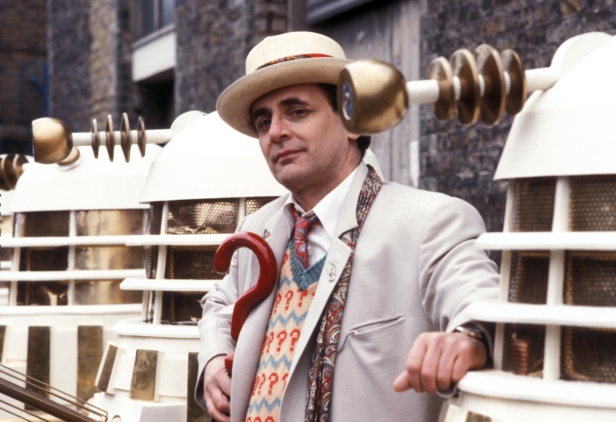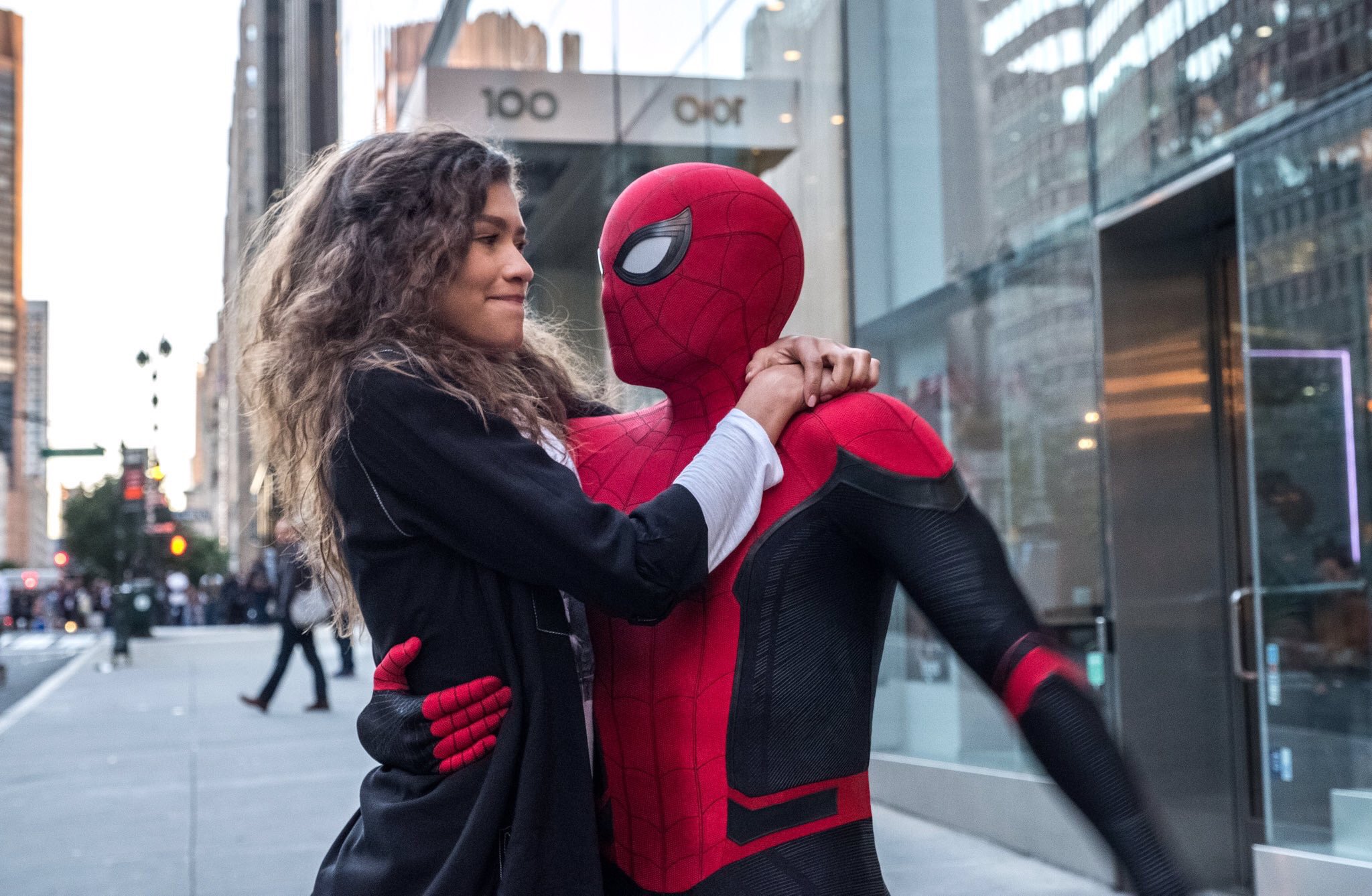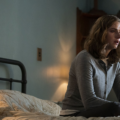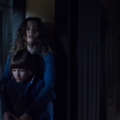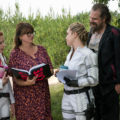Sylvester McCoy played the Doctor from 1987 to 1989 (and a bit in 1996) on television, since 1999 on audio with Big Finish, and in all sorts of other places as well. With all the available episodes of classic Doctor Who coming to BBC/ITV streaming platform Britbox on Boxing Day, we spoke to Sylvester about the show’s constant rebirths, as well as his impressive genre career.
SciFiNow: Britbox is bringing all the available episodes of classic Doctor Who together in one place for the first time. How do you feel about Doctor Who’s ability to endure through the years and through these different media?
Sylvester McCoy: Well, it does! It will! I’m so optimistic about all of that, really. Because when the 21st century Doctors came back, a new generation discovered it and then wanted more, and they independently went searching everywhere, high and low and all sorts of media and, you know, second-hand shops, to go back and find the other Doctors. This makes it much easier for the more casual viewer. It’s very exciting, I’m really excited. And it’s great that, you know, the BBC is getting this universal reach. Because there are many programmes I’d love to go back and hunt for, from my past.
Is there anything in particular?
Yes, there would be one. I did an opera, the Welsh National Opera’s A Midsummer Night’s Dream, and they recorded it for BBC Two and it went out in stereo on radio (we didn’t have a television in those days). I‘d love to go back and have a look at that.
Is there one particular story of yours from Doctor Who that you hope will be rediscovered or re-evaluated when it’s seen on Britbox?
I think the opening one, ‘Time and the Rani‘. That kind of upset a lot of people, really. I mean, it was a bit of a mish-mash because originally the story had been written for Colin Baker, and then they just rehashed it ever so quickly and they stuck me in it. So it was, in a way, a bit like wearing a costume – which I did actually do, wear Colin’s costume – so it didn’t fit well. But I quite like. It had great people in it, wonderful actors and there was some fun to be had, I thought. But also, you know, it shows my Doctor, my innocence about what Doctor Who was about. It was only doing that I suddenly learned that I’d been handed one of the great TV roles, and that I’d better mine it as much as possible and enjoy this privilege.
My one that I hope more people appreciate from yours is Delta and the Bannermen, which is underrated, I think.
Oh yes, it was great fun! We did it in the summer and it was sunny. We were down on Barry Island and it was a Butlins holiday camp. All of my childhood, I’d always wanted to go to a Butlins holiday camp, but my snobby family wouldn’t allow me. So I eventually was allowed to hang out there with Delta on the Bannerman and run about on motorbikes. It was such fun to make!

You mentioned mining the role. In your era there’s a kind of tonal shift from light to dark. Do you personally have an opinion on the kind of recipe for perfect Doctor Who? What do you think needs to be in there?
Mystery. I wanted to bring back the mystery, because when I worked out what it was all about, I realised that the mystery had gone. [Script editor] Andrew Cartmel and I were ignorant. He was a Canadian, hadn’t really seen much Doctor Who. I hadn’t seen much of Doctor Who because, you know, there was no ways of seeing it. It was gone out on a Saturday, I was working in the theatre. So ignorance was bliss in this sense and we wanted to bring back that mystery and I think that’s a very important part of it. The question mark, the ‘who?’.
I was having dinner with Steven Moffat once. He came in and he was the great producer, and then after about half an hour suddenly became a fan boy. It was an amazing transformation, really. It was glorious. He started telling me all sorts of things I didn’t really realise about my Doctor, my era, and how it had infected the 21st century Doctors, turned it from being one sort of Doctor Who to a whole new Who.
While you were making the show, were there any directors or writers who you felt particularly were a good fit for your Doctor? Were there any favourites from all the scripts?
Ben Aaronovitch’s stuff was great. I mean, I don’t want to pick! The problem is, I’m very bad at remembering names and I don’t want to pick one out and not say the others. There were some really wonderful ones. The one that really is a great mystery is ‘Ghost Light‘. Full of mystery! I think it was so obscure, at first everybody said ‘ooh, what’s this about?’. But it’s become a great favourite, hasn’t it? I think it is because it’s so mysterious and therefore, you know, you have to sit down and watch it again and again and try and work it out. I mean, a lot of it was edited badly, because they had to cut it. JN-T [producer John Nathan-Turner] was determined to make it four episodes, but the executives didn’t want it and in the end he lost and it got a bit fuzzy really.
The other bit I was sad about, which I was so proud of, is hanging off the cliff, on the ice cliff [in the story ‘Dragonfire‘, where the Doctor dangles himself off a cliff for no obvious reason]. I just thought it was a hoot to have a real cliffhanger, to actually hang off a cliff! My sense of humour. But there was a reason for it when we did it. I can’t remember what, none of us can remember what it was now. The ice broke or the pathways melted. Anyway…
You have never really stopped playing the Doctor, and obviously one of the big continuations is with Big Finish since 1999. How has that felt to continue with the character for this long?
I mean, really great because, you know, there are wonderful writers who write for Big Finish and they’ve all got their own interpretation of the Doctor. So every time you go in, he’s different in some sort of way and that’s great to perform and learn and speak those lines, and be that kind of Doctor. Sometimes it’s dangerous and dark, other times it’s jolly and fun, and other times it’s sad. They’re the ones I like. I mean, I don’t want to be solitary all the time, but every now and again I do like to do a story that’s just me, the Doctor, the kind of Doctor I was in the film when I handed over to Paul McGann, you know, that mystery that was there. I like mining that bit.
Sylvester McCoy, the persona, came out of your work with Ken Campbell, and your physical theatre background influenced the physicality of your Doctor, but is there anything else from your early life, your upbringing, that resonated with you while you were playing the Doctor, that you brought to the Doctor?
Well, I suppose in a sense, yes, my grandmother, who brought me up. She got to a hundred and, in those days, in the 80s, that wasn’t common really. My Doctor, I was told, was 950 years old or thereabouts. My granny, you know, she was still sharp as a button but she was tired, weary, she’d seen so much sadness. She’d lost children, grandchildren. She would born in the Crimean war and she’d gone through all those other wars, and poverty, and all that kind of stuff. But the longevity was the bit that interested me. And I thought ‘oh, I must try and bring that to Doctor Who’, that weariness as well. Every now and again, you know, the sadness that is there because he’s lost so many people and companions, and he’s seen such horrors. I mean, you don’t actually have to tell it, but just read breathe it, if you know what I mean?
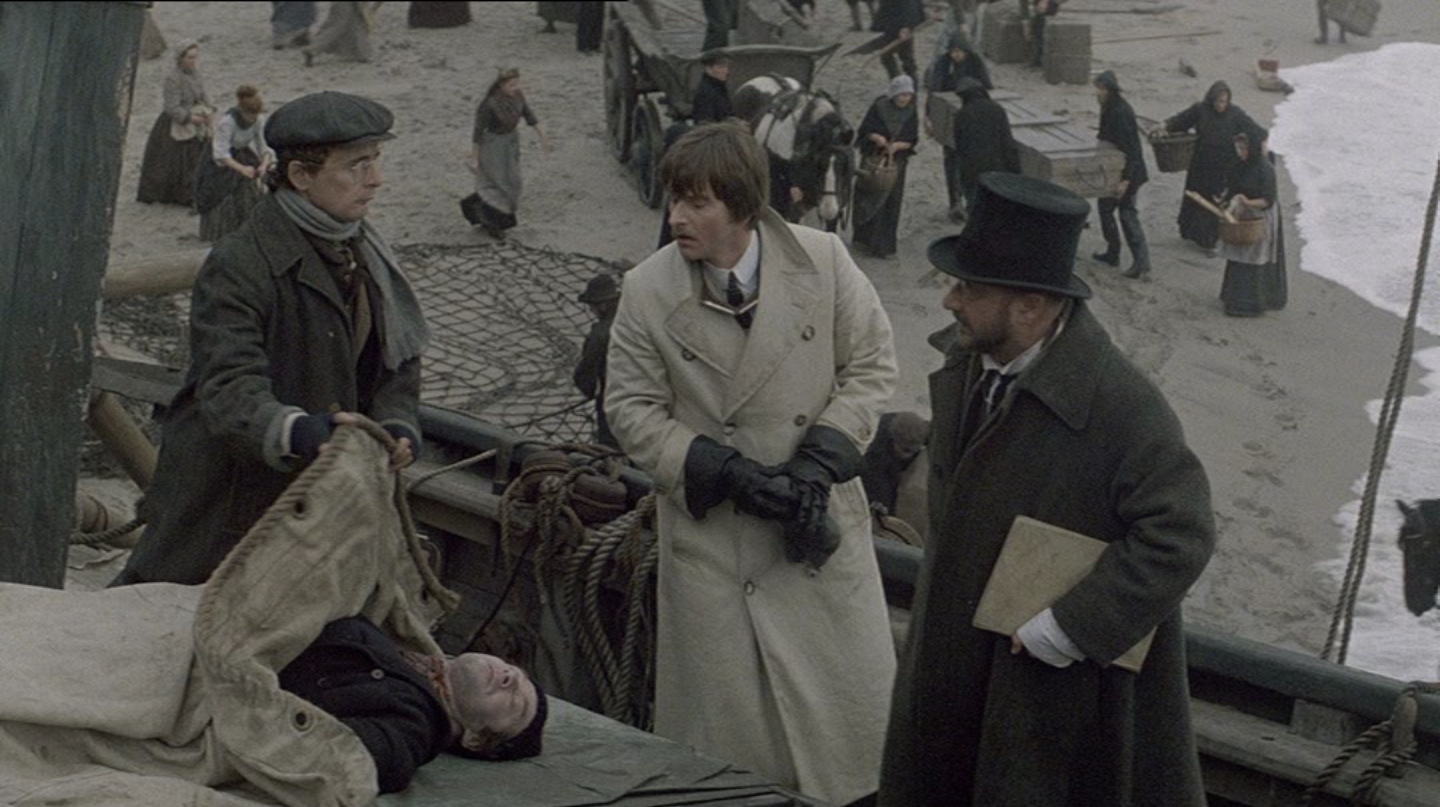
A film which will be getting re-released at some point, maybe not in the UK yet, is John Badham’s Dracula, which was an earlier role for you. I’ve read a lot about there being kind of push and pull between what [lead actor] Frank Langella wanted and what the director wanted and what the producer wanted., but what was it like from your perspective working on this film?
Yes, there was tension in the air. I think we spent 17 weeks in Cornwall in the middle of winter, in a really rather plastic hotel. It wasn’t even luxurious, you’d have thought for Laurence Olivier they’d have given him a really nice… but there was tension, you know, the tension between Olivier and Frank Langella. Badham, I liked him. He actually came to see me in a play I did, this wonderful play written for me by Adrian Mitchell called Hoagy, Bix and Wolfgang Beethoven Bunkhouse at the King’s Head, and he came and saw it. Donald Pleasence – you know, the name fits the man, he was such a lovely man – he had a New Year’s Eve party and we were all round his house and John Badham was celebrating and he was a wee bit inebriated and he said to me, ‘oh Sylvester, I’m gonna tell you what I’m gonna do. I’m gonna take all the bits I’ve cut you out of the film and put them back in again and we’ll make it into a comedy’. Because I had a lot more to do than was actually ever seen on the screen.
More recently was your appearance on Sense8 as the Old Man of Hoy. How was it joining this kind of ensemble drama in the second series?
You know, being an actor for years, you join things. You might be a guest on a long running series, and you arrive and you join. There’s always a slight discomfort. But they were great. I mean, they were really lovely. And of course the director, she was a delight. Lana Wachowski. When I went for the interview, I had no idea, because I’m so bad at names! I went in, met this lady and we got on really well. 45 minutes, chatted, didn’t do the usual thing, read, or even do a screen tests. When I left I knew I had got the part. We hit it off, really. I went back and I phoned my son and I said ‘there was this Wachowski…’ and he went ‘WHAT?! WACHOWSKI?!! OH GOD!!’. So excited. Thank God I didn’t know. If I’d have tied it up with The Matrix or something like that, I might’ve been a bit nervous, but I wasn’t so that was good. That was a positive about not being able to remember names. Most of the time it’s a negative. It’s like a sad life of trying to figure out ‘what’s his name? Tell me somebody please’ ‘That’s your son!’ ‘Oh right, thank you!’

How do you feel interacting with Doctor Who fandom, but also science fiction and Lord of the Rings and all these other fans that you encounter? How’s that changed you as a person?
Well, it’s brought a hell of a lot of joy into my life, really. And also humility, and kind of being incredibly touched, because as an actor – I’d been an actor for many years before I did Doctor Who – you have an effect on an audience. You hear them laugh, you hear them cry in the theatre, or every now and again if you do a telly or a film, you bump into someone in the street and they might say something nice. But working with the fans and meeting them all around the world, they come to you and tell you that ‘you got me through my childhood’, ‘I had an unhappy childhood but Doctor Who was there for me’. I’ve met scientists who said ‘I became a scientist, I became a doctor because of you and Doctor Who’ and you think ‘wow, I was only trying to learn the lines and not bump into the monsters’. I didn’t realise that there was this other effect. So it’s very touching, moving and humbling. I’d say that.
When you started on Doctor Who in 1987, was this something you expected? When you started there were already conventions and things, and you guys would go over to America and whatever else, but has it still surpassed your expectations the way that it’s carried on?
Absolutely. Yes. It has completely. Really. I mean, when I got the part, I didn’t even know what a convention was. My only knowledge of conventions was Laurel and Hardy’s Sons of the Desert where they go to a convention, which is very funny. Bizarrely, in this film where they go to this convention, they wear fezzes. Now I’m going to conventions and people are wearing fezzes and I think ‘a-ha! At last I’ve got into a Laurel and Hardy film!’
Doctor Who coming to BBC/ITV streaming platform Britbox on Boxing Day. Get all the latest sci-fi news with every issue of SciFiNow.
